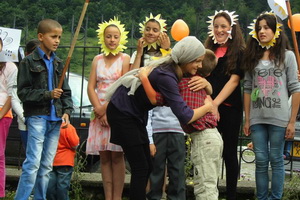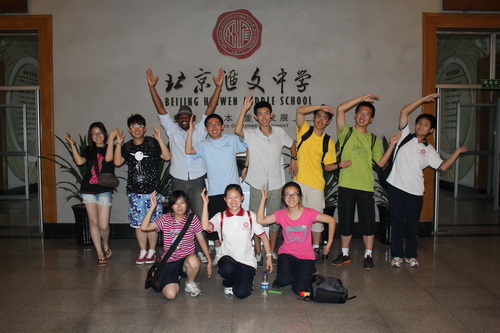Previous Projects for Peace Recipients
2022 – Aimee Yan ’24, Brooke Chow ’24, Michael Zhang ’25 and Pratyush Seshadri ’25: Visibility Forward: Addressing Anti-AAPI Violence through Culturally Representative Education
Aimee Yan, a sophomore studying public policy and Asian studies; Brooke Chow, a sophomore studying public policy and business administration; Michael Zhang, a first-year studying education and public policy; and Pratyush Seshadri, a first-year studying mathematics and economics, received a 2022 Projects for Peace grant for their project, Visibility Forward: Addressing Anti-AAPI Violence through Culturally Representative Education. Visibility Forward is an educational organization they founded that seeks to increase the teaching of Asian American history in secondary school classrooms throughout the United States. To that end, the organization plans to compile a comprehensive catalogue of resources that educators can utilize and incorporate into their own lesson plans. Visibility Forward plans to implement change through policy development to ensure knowledge of Asian American issues and understanding within North Carolina and the broader US. In light of anti-Asian violence during the COVID-19 pandemic, Visibility Forward’s ultimate goal is to increase public well-being and safety, increase Asian American visibility, and create a more compassionate society.
2021 – Fariha Rahman ’21 and Merve Rida Bayraktar ’23: FreeTechLib at Pink STREAM
Fariha Rahman, a senior studying health policy and management with minors in chemistry and biology, and Merve Rida Bayraktar, a sophomore studying computer science and the founder of Pink STREAM, received a 2021 Projects for Peace grant for their project, FreeTechLib at Pink STREAM (FTLPS). Since 2019, Pink STREAM has offered free courses and workshops in a variety of topics, including 3D printing, electronics, robotics and app design to youth who have access to the necessary technology to participate. FTLPS will be a free technology library that will enable Pink STREAM, an organization working toward educating and empowering K-8 girls in STREAM (Science, Technology, Robotics, Engineering, Arts and Math), to make their classes more accessible to refugee girls who may be unable to participate due to lack of access to the technology.
2020 – Nesreen Abu Khalaf ’20: Civic Tech Clubouse for Young Jordinian Women
The 2020 Projects for Peace grant was canceled due to the COVID-19 pandemic.
We would like to recognize Nesreen Abu Khalaf, a senior studying public policy and information science in the College of Arts and Sciences, for being selected to receive the 2020 Projects for Peace grant for her proposed project: Civic Tech Clubhouse for Young Jordanian Women. Abu Khalaf identified declining economic and social conditions of the working class in Jordan that disproportionately impact women. To address these issues, she proposed a free summer camp designed to empower and engage young Jordanian women through innovation and technology. With a civic-focused STEM camp, her project aimed to engage Jordanian women to develop, learn and implement technology-focused service initiatives. Her project sought to encourage participants to bring what they learned to similar clubs in their own schools in an effort to promote peace and sustainable development across Jordan.
2019 – Maya Weinberg ’19 and Paulina Covarrubias Álvarez : Semillas Sostenibles (Sustainable Seeds)
Maya Weinberg, a senior political science and Latin American studies major, and Paulina Covarrubias Álvarez, a junior at Universidad de las Américas Puebla, partnered with Puente a la Salud Comunitaria to address the dropping value of small-scale cultivation by helping farmers transition to different varieties of amaranth in the Central Valleys region of Oaxaca, Mexico. The decline of produce prices has led to cartels targeting farmers to produce poppy which is used to produce illicit drugs, further fueling the drug war. Weinberg and Álvarez worked to construct a seed bank that supported communities in building a larger and tighter network of farmers, thus enriching their social and professional infrastructure.
2018 – Eduardo Fernandez ’17 and Jacob Stocks ’18: Child Nutrition and Health Care for Women in Lawra, Ghana
This project focused on addressing inadequacies in child nutrition and healthcare for women in Lawra, Ghana. By collecting data and partnering with local clinics, Fernandez and Stocks aimed to significantly decrease the level of child malnutrition and make a lasting improvement to women’s health through education and outreach work. Fernandez and Stocks are members of Project Heel, a Campus Y organization that has a long history of successful public service projects.
2017 – Godwin Attigah ’18 and Crystal Yuille ’17: Project Kijani – Reducing Conflict through Entrepreneurship
The Peace Award for Project Kijani – Efficient and Affordable Cooking Fuel project developed and distributed a clean, eco-friendly yet cheaper form of cooking fuel to the people of Atebubu, Ghana. The Kijani Pellets made use of locally sourced waste materials like sawdust and agricultural waste that were processed into solid chunks of cooking fuel. These pellets provide a healthier alternative to charcoal and firewood, subsequently helping to increase access to cultivable land and reduce conflict between farmers and charcoal companies.
2016 – Robert Alfredson ’17 and Diwash Thapa ’16: Bridging Educational Divides through Scientific Mentorship in Kathmandu
Bridging Educational Divides through Scientific Mentorship in Kathmandu centered on creating a scientific laboratory for students at a secondary school on the outskirts of Kathmandu, Nepal. The project also established a physical and digital network between the students and undergraduate mentors at Nepalese universities Trinity International College and Institute of Engineering, Thapathali.
2015 – Nicole Fauster and Layla Quran: The Unwelcome Guests: The Case of Migrant Workers in Jordan
Fauster and Quran raised awareness of the case of migrants in Jordan through educational clinics for University of Jordan students, created to identify and build upon shared attributes between Jordanian citizens and migrant workers. The team also created a short film consisting of interviews with migrant workers in Jordan, non-government organization workers, lawyers and activists.
2014 – Kelsey Aho ’14: Multilateral Dialogue in the Prokletije/ Bjeshkët e Namuna
 This project is a foundation for sustaining peace in the region by reintroducing neighbors through a multicultural dialogue. Through international volunteer education and multicultural youth exchanges, environmental cooperation was a tool for transcending political boundaries to promote regional trust and stability.
This project is a foundation for sustaining peace in the region by reintroducing neighbors through a multicultural dialogue. Through international volunteer education and multicultural youth exchanges, environmental cooperation was a tool for transcending political boundaries to promote regional trust and stability.
2013 – Madiha Bhatti ’14 and Danielle Bulinski ’13: Compassionate Labor in Liberia
This project addressed high rates of maternal mortality, mistrust among residents and a lack of confidence in medical establishments through a healthcare model that empowered women, built relationships and facilitated trust in healthcare.
2012 – Amna Baloch ’12, Sarah Mohamed ’12 and Morgan Smallwood ’12: Zenica Peace Alliance
This is a diversity program for youth in Bosnia developed with a local community partner. Throughout the summer, 25 diverse youth participated in discussions, community service and fun under the supervision of local college-aged mentors. The participants and mentors represented all three major ethnic groups found in Bosnia, including Croats, Bosniaks and Serbs. The program also hosted visits from the former mayor of Zenica, an American Embassy representative, and several community members.
2011 – Yu Zhou: Young Scholars International

Young Scholars International facilitated cross-cultural communication through academic conversations. During the summer of 2011, Zhou and 14 UNC students conducted seminars on a variety of disciplines at high schools and universities in Beijing and Tianjin, China. The seminars were designed to introduce Chinese high school students to a range of academic disciplines, help participants recognize a common humanity among people with differences, and foster critical understanding in establishing healthy relationships among Chinese and Western cultures.
2010 – Brendan Yorke: Postcards for Progress
Postcards for Progress used the arts to connect youth separated by cultural differences. In 2010, 16 UNC students traveled to various countries where they implemented exchanges between the youth of those countries. Middle school students exchanged 5×7 paintings, letters and other art pieces. A website gallery and discussion forum promoted continued dialogue between participants. Postcards for Progress continues to help youth learn how to interact with culturally diverse peers both across the world and in their own classroom. Postcards for Progress is rooted in the campus community with integration of Carolina Navigators and other campus organizations.
